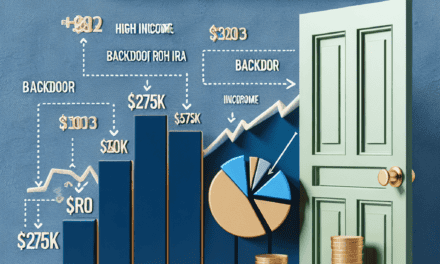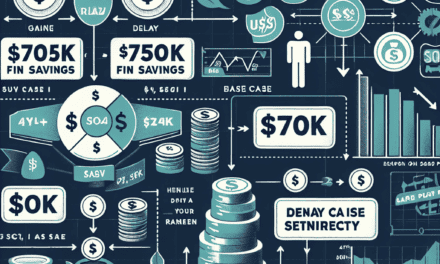“High Stakes: Bill Ackman’s $277 Million Bet on America’s Future”
Introduction
Bill Ackman, the renowned hedge fund manager and CEO of Pershing Square Capital Management, has made headlines with a bold $277 million wager on the outcome of the U.S. presidential race. Known for his high-stakes investment strategies and activist approach, Ackman’s latest move underscores his willingness to leverage significant capital in pursuit of substantial returns. This strategic bet reflects his analysis of the political landscape and its potential impact on financial markets, highlighting his confidence in predicting electoral outcomes and their economic implications. Ackman’s investment decision not only showcases his risk-taking ethos but also positions him as a key player in the intersection of finance and politics, drawing attention from both Wall Street and political observers.
Understanding Bill Ackman’s $277 Million Bet: A Financial Analysis
Bill Ackman, the renowned hedge fund manager and CEO of Pershing Square Capital Management, has made headlines with his audacious $277 million wager on the U.S. presidential race. This bold move has captured the attention of financial analysts and political observers alike, prompting a closer examination of the underlying strategies and potential implications of such a significant investment. To understand the rationale behind Ackman’s decision, it is essential to delve into the intricacies of financial markets, the nature of political risk, and the potential outcomes of the upcoming election.
At the heart of Ackman’s bet lies the concept of political risk, which refers to the uncertainty and potential financial loss that can arise from political events. In the context of the U.S. presidential race, political risk is particularly pronounced, given the stark policy differences between candidates and the potential for significant shifts in economic and regulatory landscapes. Ackman, known for his astute market insights, appears to be leveraging this risk to his advantage, betting on the market’s reaction to the election outcome rather than on a specific candidate’s victory.
To execute this strategy, Ackman has likely employed a combination of derivatives, such as options and futures, which allow investors to speculate on the direction of market movements without directly owning the underlying assets. These financial instruments provide a mechanism to hedge against adverse market conditions or capitalize on anticipated volatility. By placing a substantial bet on the election, Ackman is effectively positioning himself to benefit from market fluctuations that may arise from the election results, regardless of which candidate ultimately prevails.
Moreover, Ackman’s decision to invest such a significant sum underscores his confidence in his market predictions and his willingness to embrace calculated risks. This approach is consistent with his investment philosophy, which often involves taking bold positions based on thorough research and analysis. Ackman’s track record of successful investments, including his well-publicized bets on companies like Chipotle and Herbalife, lends credibility to his current wager, suggesting that he has identified a compelling opportunity in the political arena.
In addition to the financial mechanics of Ackman’s bet, it is important to consider the broader implications of such a high-profile investment. The sheer scale of the wager has the potential to influence market sentiment, as other investors may interpret Ackman’s actions as a signal of expected market volatility or a particular election outcome. This, in turn, could lead to increased trading activity and heightened market sensitivity to political developments, further amplifying the impact of the election on financial markets.
Furthermore, Ackman’s bet highlights the growing intersection of finance and politics, as investors increasingly recognize the influence of political events on market dynamics. This trend underscores the importance of incorporating political analysis into investment strategies, as the outcomes of elections and policy decisions can have far-reaching consequences for businesses and economies.
In conclusion, Bill Ackman’s $277 million wager on the U.S. presidential race represents a calculated gamble that reflects his confidence in navigating political risk and capitalizing on market volatility. By leveraging financial instruments and his expertise in market analysis, Ackman aims to turn uncertainty into opportunity. As the election approaches, the outcome of his bet will not only impact his own portfolio but also serve as a barometer for the broader financial community, illustrating the intricate relationship between politics and markets.
The Impact of Political Bets on Financial Markets
Bill Ackman, a prominent hedge fund manager known for his bold investment strategies, recently made headlines with a $277 million wager on the outcome of the U.S. presidential race. This move has sparked considerable interest and debate within financial circles, as it underscores the intricate relationship between political events and financial markets. Political bets, such as Ackman’s, can have profound implications for market dynamics, influencing investor sentiment and potentially altering the trajectory of various asset classes.
To understand the impact of such political bets, it is essential to consider the broader context in which they occur. Financial markets are inherently sensitive to political developments, as government policies can significantly affect economic conditions. For instance, changes in tax regulations, trade policies, and government spending can all influence corporate profitability and, consequently, stock prices. Therefore, investors closely monitor political events, including elections, to anticipate potential shifts in policy that could impact their portfolios.
Ackman’s substantial wager is a testament to the high stakes involved in political betting. By placing such a significant bet, he is effectively expressing a strong conviction about the election’s outcome and its potential impact on the markets. This move can be seen as a strategic attempt to capitalize on anticipated market movements resulting from the election. However, it also highlights the inherent risks associated with political bets, as the outcome of elections can be unpredictable, and market reactions can be volatile.
Moreover, Ackman’s wager reflects a broader trend of increased interest in political betting among institutional investors. In recent years, there has been a growing recognition of the importance of political analysis in investment decision-making. Hedge funds and other institutional investors are increasingly incorporating political risk assessments into their strategies, seeking to gain an edge in a complex and interconnected global market. This trend underscores the evolving nature of financial markets, where traditional economic indicators are now complemented by political considerations.
The impact of political bets on financial markets extends beyond individual investors like Ackman. Such bets can influence market sentiment, as they often attract significant media attention and can shape public perceptions of the election’s likely outcome. When high-profile investors make substantial political bets, it can lead to increased market volatility, as other investors react to the perceived implications of these bets. This, in turn, can create opportunities for traders to profit from short-term price fluctuations, but it also introduces additional risks for those unprepared for sudden market shifts.
Furthermore, political bets can have a cascading effect on various asset classes. For example, if a particular election outcome is expected to favor certain industries or sectors, investors may adjust their portfolios accordingly, leading to shifts in stock prices and sector performance. Similarly, currency markets can be affected by political bets, as changes in government leadership can influence exchange rates and international trade dynamics.
In conclusion, Bill Ackman’s $277 million wager on the U.S. presidential race serves as a compelling illustration of the impact of political bets on financial markets. Such bets highlight the intricate interplay between politics and finance, where investor sentiment and market dynamics are closely intertwined with political developments. As institutional investors increasingly incorporate political analysis into their strategies, the influence of political bets on financial markets is likely to grow, shaping the landscape of investment decision-making in the years to come.
Bill Ackman’s Investment Strategies: Lessons from the Presidential Race Wager
Bill Ackman, the renowned hedge fund manager and CEO of Pershing Square Capital Management, has long been known for his bold investment strategies and willingness to take significant risks. His recent $277 million wager on the U.S. presidential race is no exception, offering a fascinating case study in the intersection of finance, politics, and strategic foresight. This move, while audacious, is not without precedent in Ackman’s career, as he has consistently demonstrated a keen ability to anticipate market shifts and capitalize on them.
To understand the rationale behind Ackman’s investment, it is essential to consider the broader context of his investment philosophy. Ackman is known for his activist investing approach, where he takes substantial positions in companies and then actively works to influence their management and strategic direction. This strategy requires not only a deep understanding of the companies he invests in but also a broader awareness of economic and political trends that could impact those investments. In this light, his wager on the presidential race can be seen as an extension of his broader investment strategy, where political outcomes are viewed as potential catalysts for market movements.
Moreover, Ackman’s decision to place such a significant bet on the presidential race underscores the growing recognition of the impact that political events can have on financial markets. Elections, particularly in a country as influential as the United States, can lead to substantial shifts in economic policy, regulatory environments, and international relations, all of which can have profound implications for investors. By positioning himself to benefit from these potential changes, Ackman is effectively hedging against the uncertainty that often accompanies election cycles.
In addition to highlighting the importance of political awareness in investment strategies, Ackman’s wager also serves as a reminder of the value of risk management. While the size of the bet is undoubtedly large, it is crucial to recognize that Ackman is not merely gambling on a single outcome. Instead, he is likely employing a range of financial instruments and strategies to manage the risk associated with this investment. This approach allows him to potentially profit from various scenarios, regardless of the election’s outcome, thereby demonstrating the importance of flexibility and adaptability in investment strategies.
Furthermore, Ackman’s investment in the presidential race can be seen as a reflection of his confidence in his analytical capabilities and his ability to navigate complex and uncertain environments. This confidence is not unfounded, as Ackman has a track record of making successful high-stakes investments, such as his well-publicized bet against the U.S. housing market prior to the 2008 financial crisis. By leveraging his expertise and experience, Ackman is positioning himself to potentially reap significant rewards from his latest venture.
In conclusion, Bill Ackman’s $277 million wager on the U.S. presidential race offers valuable insights into the intricacies of investment strategies in the context of political events. It underscores the importance of understanding the broader economic and political landscape, the necessity of effective risk management, and the value of confidence and adaptability in navigating uncertain environments. As investors continue to grapple with the complexities of an ever-changing world, Ackman’s approach serves as a compelling example of how to strategically position oneself to capitalize on emerging opportunities.
The Role of Hedge Funds in Political Betting
In recent years, the intersection of finance and politics has become increasingly pronounced, with hedge funds playing a pivotal role in this dynamic landscape. A striking example of this trend is Bill Ackman’s $277 million wager on the U.S. presidential race, a move that underscores the growing influence of hedge funds in political betting. This development not only highlights the financial clout of hedge funds but also raises questions about the implications of such investments on the political process.
Hedge funds, known for their aggressive investment strategies and substantial capital reserves, have long been influential players in financial markets. However, their foray into political betting marks a new chapter in their evolution. By placing significant bets on electoral outcomes, hedge funds like Ackman’s are not merely passive observers but active participants in the political arena. This involvement is facilitated by the increasing availability of political betting markets, which allow investors to speculate on the outcomes of elections and other political events.
The rationale behind Ackman’s substantial wager is multifaceted. On one hand, it reflects a strategic financial decision, leveraging the volatility and uncertainty inherent in political events to potentially yield high returns. On the other hand, it signifies a broader trend of hedge funds seeking to diversify their portfolios by venturing into non-traditional investment areas. This diversification is particularly appealing in an era of economic uncertainty, where traditional markets may not offer the same level of opportunity.
Moreover, Ackman’s bet is emblematic of the sophisticated analytical capabilities that hedge funds possess. These entities employ teams of analysts and utilize advanced data analytics to assess political trends, voter behavior, and other factors that could influence election outcomes. By doing so, they aim to make informed predictions that can guide their investment strategies. This analytical prowess not only enhances their ability to profit from political events but also positions them as influential stakeholders in the political process.
However, the involvement of hedge funds in political betting is not without controversy. Critics argue that such activities could lead to undue influence over political outcomes, as the financial stakes involved may incentivize hedge funds to engage in lobbying or other forms of political intervention. Furthermore, the sheer scale of investments like Ackman’s raises concerns about the potential for market manipulation, where large financial entities could sway public opinion or electoral processes to align with their financial interests.
Despite these concerns, it is important to recognize that political betting by hedge funds is a reflection of broader trends in the financial industry. As markets become increasingly interconnected and complex, investors are continually seeking new avenues for profit. Political events, with their inherent unpredictability and potential for significant impact, present a lucrative opportunity for those willing to navigate the associated risks.
In conclusion, Bill Ackman’s $277 million wager on the U.S. presidential race exemplifies the growing role of hedge funds in political betting. This development highlights the financial acumen and influence of these entities while also raising important questions about the implications of their involvement in the political sphere. As hedge funds continue to explore new investment frontiers, their impact on both financial markets and political processes is likely to remain a topic of significant interest and debate.
How Political Outcomes Influence Stock Market Trends
Bill Ackman, a prominent hedge fund manager known for his bold investment strategies, recently made headlines with a $277 million wager on the outcome of the U.S. presidential race. This move underscores the intricate relationship between political outcomes and stock market trends, a dynamic that investors closely monitor. Understanding how political events influence market behavior is crucial for both seasoned investors and those new to the financial world.
Political outcomes can significantly impact stock markets, as government policies directly affect economic conditions. For instance, a presidential candidate’s stance on taxation, regulation, and trade can alter corporate profitability and investor sentiment. When a candidate who favors lower taxes and deregulation is elected, markets often react positively, anticipating a business-friendly environment that could boost corporate earnings. Conversely, a candidate advocating for higher taxes and increased regulation might trigger market apprehension, as investors weigh the potential impact on company profits.
Bill Ackman’s substantial investment reflects his anticipation of how the election results could sway market trends. By placing such a significant bet, Ackman is essentially predicting that the election outcome will create favorable conditions for certain sectors or the market as a whole. This strategy is not uncommon among hedge fund managers, who often use political events as a basis for their investment decisions. However, it is important to note that while political outcomes can influence markets, they are just one of many factors that investors consider.
The stock market’s reaction to political events is often immediate, as investors quickly adjust their portfolios based on perceived risks and opportunities. For example, in the days leading up to an election, market volatility may increase as investors speculate on potential outcomes. Once the results are announced, markets typically experience a period of adjustment as investors digest the implications of the new political landscape. This period can present both challenges and opportunities, as some sectors may benefit from new policies while others may face headwinds.
Moreover, the influence of political outcomes on stock markets is not limited to domestic policies. International relations and trade agreements also play a crucial role. A president’s approach to foreign policy can affect global markets, as changes in trade agreements or diplomatic relations can impact international business operations. Investors must therefore consider both domestic and international political factors when assessing market trends.
While Ackman’s wager is a high-stakes gamble, it highlights the importance of understanding the broader economic and political context in which markets operate. Investors must remain vigilant, keeping an eye on political developments and their potential impact on market dynamics. This requires a comprehensive approach that considers not only the immediate effects of political outcomes but also their long-term implications for economic growth and stability.
In conclusion, Bill Ackman’s $277 million bet on the U.S. presidential race serves as a reminder of the significant influence political outcomes can have on stock market trends. As investors navigate the complexities of the financial world, understanding the interplay between politics and markets is essential. By staying informed and considering the broader context, investors can better position themselves to capitalize on opportunities and mitigate risks in an ever-changing political and economic landscape.
The Ethics of Betting on Political Events: A Debate
Bill Ackman’s $277 million wager on the U.S. presidential race has sparked a significant debate regarding the ethics of betting on political events. As a prominent hedge fund manager, Ackman’s decision to place such a substantial bet has drawn attention not only to the potential financial implications but also to the moral considerations surrounding the practice of wagering on political outcomes. This debate is multifaceted, involving questions about the influence of money in politics, the integrity of democratic processes, and the broader societal impact of treating elections as speculative ventures.
To begin with, the influence of money in politics is a longstanding concern, and Ackman’s bet amplifies these worries. Critics argue that when individuals or entities with significant financial resources engage in betting on political events, it could lead to undue influence over the electoral process. The fear is that such actions might encourage a perception that elections are commodities to be traded rather than civic duties to be respected. This perception could undermine public trust in democratic institutions, as it suggests that financial power can sway political outcomes, thereby eroding the foundational principle of equal representation.
Moreover, the integrity of democratic processes is called into question when political betting becomes prevalent. Elections are designed to reflect the will of the people, and introducing a financial incentive into this equation could distort that reflection. For instance, if influential figures like Ackman are seen to profit from electoral outcomes, it might incentivize others to engage in similar practices, potentially leading to a scenario where financial interests overshadow genuine political discourse. This could result in a political landscape where decisions are driven by potential monetary gains rather than the public good, thereby compromising the essence of democracy.
In addition to these concerns, the societal impact of treating elections as speculative ventures cannot be overlooked. Betting on political events could trivialize the significance of elections, reducing them to mere opportunities for financial gain. This perspective risks diminishing the civic responsibility associated with voting and participating in democratic processes. Furthermore, it could contribute to a culture of cynicism, where citizens become disillusioned with the political system, perceiving it as a game for the wealthy rather than a mechanism for societal progress.
However, proponents of political betting argue that it can serve as a form of expression and engagement. They contend that wagering on elections allows individuals to express their beliefs and predictions about political outcomes, thereby fostering a more engaged and informed electorate. Additionally, some suggest that political betting markets can provide valuable insights into public sentiment and electoral trends, potentially serving as a tool for political analysis.
Despite these arguments, the ethical implications of betting on political events remain contentious. The potential for financial interests to overshadow democratic principles is a significant concern, and the risk of undermining public trust in electoral processes cannot be ignored. As such, the debate over the ethics of political betting is likely to persist, particularly as figures like Bill Ackman continue to make high-profile wagers on electoral outcomes.
In conclusion, while the financial aspects of Bill Ackman’s $277 million wager on the U.S. presidential race are noteworthy, the ethical considerations it raises are equally significant. The debate touches on fundamental questions about the role of money in politics, the integrity of democratic processes, and the societal impact of treating elections as speculative ventures. As this discussion continues, it is crucial to consider the broader implications of political betting and its potential effects on the democratic fabric of society.
Historical Precedents: Major Financial Bets on Political Outcomes
In the realm of finance, where risk and reward are inextricably linked, the intersection of politics and investment strategies often yields fascinating narratives. One such narrative is the recent $277 million wager by Bill Ackman, a prominent hedge fund manager, on the outcome of the U.S. presidential race. This bold move is not without historical precedent, as financial markets have long been influenced by political events, with investors seeking to capitalize on anticipated shifts in policy and governance. To understand the significance of Ackman’s bet, it is essential to explore the historical context of major financial bets on political outcomes.
Throughout history, investors have attempted to predict political outcomes to gain a financial edge. For instance, during the 19th century, the Rothschild family famously leveraged their extensive network of information to gain early insights into the outcome of the Battle of Waterloo. By acting swiftly on this intelligence, they were able to make substantial profits in the bond market. This early example underscores the potential for financial gain when political foresight is combined with strategic investment.
Moving forward to the 20th century, the 1948 U.S. presidential election between Harry Truman and Thomas Dewey presented another opportunity for investors to place significant financial bets. The Chicago Daily Tribune’s premature headline declaring Dewey the winner led to market fluctuations, as investors scrambled to adjust their positions based on the anticipated policies of a Dewey administration. However, Truman’s unexpected victory resulted in a rapid market correction, highlighting the inherent risks of betting on political outcomes.
In more recent times, the 2016 U.S. presidential election between Donald Trump and Hillary Clinton served as a stark reminder of the unpredictability of political events. Many investors, anticipating a Clinton victory, positioned their portfolios accordingly. However, Trump’s unexpected win led to significant market volatility, with sectors such as healthcare and financials experiencing dramatic shifts in value. This event underscored the importance of hedging strategies and diversification when engaging in politically motivated investments.
Bill Ackman’s $277 million wager on the U.S. presidential race can be seen as a continuation of this historical trend. Ackman, known for his activist investment style and willingness to take substantial risks, is likely betting on the potential impact of the election on specific sectors or policies. While the details of his wager remain undisclosed, it is plausible that Ackman is positioning his portfolio to benefit from anticipated changes in areas such as taxation, regulation, or international trade.
The implications of Ackman’s bet extend beyond his personal financial interests. Such high-stakes wagers can influence market sentiment, as other investors may interpret his actions as a signal of potential political outcomes. This, in turn, can lead to increased market volatility, as investors adjust their positions in response to perceived risks and opportunities.
In conclusion, Bill Ackman’s $277 million wager on the U.S. presidential race is a testament to the enduring relationship between politics and finance. By examining historical precedents, it becomes clear that while the potential for profit exists, so too does the risk of significant loss. As investors navigate the complexities of political events, the lessons of the past serve as a valuable guide, reminding us of the importance of strategic foresight and prudent risk management in the ever-evolving landscape of financial markets.
Q&A
1. **What is Bill Ackman’s $277 million wager about?**
Bill Ackman has placed a $277 million bet on the outcome of the U.S. presidential race, likely through financial instruments that would benefit from market volatility or specific election outcomes.
2. **How did Bill Ackman place this wager?**
Ackman likely used derivatives such as options or futures contracts to position his hedge fund, Pershing Square Capital Management, to profit from anticipated market movements related to the election.
3. **What is the rationale behind Ackman’s wager?**
Ackman may believe that the election will lead to significant market volatility or that certain policies from the winning candidate will impact specific sectors or the broader market.
4. **What are the potential risks of Ackman’s wager?**
The risks include the possibility of the election outcome not aligning with his expectations, leading to financial losses, or market reactions differing from historical patterns.
5. **Has Bill Ackman made similar wagers in the past?**
Yes, Ackman is known for making large, high-profile bets, such as his successful wager against the market during the COVID-19 pandemic in early 2020.
6. **What impact could Ackman’s wager have on the market?**
While individual bets may not directly impact the market, Ackman’s actions could influence other investors’ perceptions and strategies, potentially contributing to market volatility.
7. **What is the public reaction to Ackman’s wager?**
Public reaction is mixed, with some viewing it as a savvy financial move and others criticizing it as speculative or risky, reflecting broader debates about the role of hedge funds in financial markets.
Conclusion
Bill Ackman’s $277 million wager on the U.S. presidential race represents a significant financial bet on the outcome of the election, reflecting his confidence in predicting political events and their impact on markets. Such a substantial investment underscores the intersection of politics and finance, where major investors like Ackman leverage their insights to potentially capitalize on electoral outcomes. This move highlights the broader trend of financial markets being influenced by political developments, with investors seeking to hedge or profit from anticipated changes in policy and governance. Ackman’s decision also illustrates the high-stakes nature of political betting, where the potential for substantial gains is matched by equally significant risks.





